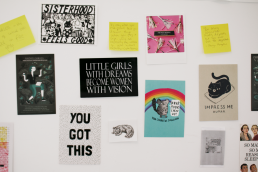Photo credit: Josie Deacon
We love what we do, and we try to share our workplace activities on social media whenever we get a chance. But what’s it like to work at Fearless Femme? Are we all running around trying to get copy for hard deadlines and drinking too much coffee? Do all our staff and volunteers feel fearless all of the time? And how, as a mental health project, do we look after our own wellbeing? In the spirit of openness and transparency, we’ve put together a ‘behind-the-scenes’ FAQ on our working life.
I’ve just had a look at your website, and all the great articles. So… you’re essentially an online magazine?
Yes… and no. We are first and foremost a mental health project and creative community, with the aim of creating a safe space where young women and non-binary people can share their stories and connect with each other. We also encourage our volunteers and readers to feed their voices and experiences into our mental health research and policy recommendations. We’re trying to tackle the stigma of mental ill-health face-on, by replacing ‘shame’ with resilience and community, and by improving the policy context in which people are trying to get mental health support.
A large part of what we do on a month-to-month basis is producing our beautiful digital magazine and our fabulous website content showcasing all the articles, short stories, poetry, illustration, photography and podcasts that our wonderful volunteers donate. But that’s not all we do. We also focus on conducting evidence-based research on the mental health of young people – especially students – so that we can feedback our analysis and recommendations to the government, colleges and universities.
We’re doing this research in partnership with the University of Edinburgh and this is all part of our social mission to improve the mental health of young women and non-binary people. We’re also meticulous about monitoring and evaluating our social impact and whether we’re meeting our social objectives.
As well as extensively using social media platforms, we also reach out through other means – for instance, through collaborations with youth, mental health and women’s organisations. We’re happy to give talks and advice on supporting mental health to private audiences or public events and we’ve also volunteered our own time to help other like-minded initiatives. We’re not like commercial magazines run on a for-profit basis. We’re a non-profit organisation – a social enterprise – with a social mission carried out through community-building, publishing, social impact and research.
Interesting stuff. Could you tell me more about your research?
We take mental health seriously, and we want to know why so many people are struggling so we can make effective recommendations and interventions about what we can do about it. In May 2018 we launched a Fearless Femme Research Programme as a core part of our activities. So far, we’ve conducted six research surveys, almost 30 polls on social media, and we’ve collected over 300 pieces of data so far.
Our first tranche of surveys and polls focused on several issues, including Body Image, LGBTQIA+ and Pride, Mental Health in the Workplace and Mental Health Policy. However, our greatest focus of attention so far has been on the student experience – both in terms of university and college, and moving into the challenging transitional months of leaving higher education.
Our findings confirm there’s a mental health crisis among young women and non-binary people, especially students, and it’s happening against a backdrop of NHS cuts, Brexit pressures and threats of further healthcare privatisation. In addition to this external context, our findings also show that people subjectively don’t feel able to shape policies to make the changes needed to improve our health and we want to change that.
In the next few months we’ll be publishing our research reports outlining our findings and policy recommendations to date. We want to give our readers and volunteers a voice to shape mental health policy and make real tangible change. If you want to help us with our mission, for instance by filling in some of our surveys or sending us your feedback or views, please get in touch.
What’s a normal day in the Fearless Femme office like?
I bet you’re imagining a scene from The Devil Wears Prada, with gossiping, backbiting, horrible bosses, lots of coffee consumption and constant deadlines. Well you’d be right on two fronts – we do drink gallons of coffee and we have weekly, monthly and quarterly deadlines across all of our outputs – our research, website, digital magazine, newsletter and funder reports. But that’s where the similarity ends because we are incredibly fortunate to have the Best Team In The World™.
Unlike many other workplaces, all our staff actually look forward to coming into the office and hanging out with each other. And equally unlike other workplaces, we always put our mental health and self-care first. So if there’s too much pressure to meet one of the deadlines we’ve just mentioned, we try to push it back. If someone’s not having a good mental health day, we take the time to re-charge. We try also to always be there for each other if one of us is feeling a bit low. We have a lot of feminist banter and almost as much cake (because one of our staff members loves to bake and feed the team).
We take workplace wellbeing incredibly seriously, and we’re constantly on the look-out for new self-care ideas to incorporate into our office lives. We often have a mindfulness session before team meetings, we’ve tried yoga at lunchtime, we have an ‘aromatherapy vape egg’ on during office hours so we get wafts of lavender and clary sage essential oils throughout the day and we have Friday lunches together to make sure we have time as a team every week. Recently we’ve begun inviting external speakers to come and talk to us about workplace wellbeing and stress, and for days when we could all use some furry dopamine hits, Nugget the unofficial therapet comes to join us.
Another thing that might make us a bit different to other organisations is that our staff all work part-time, and come in on different days, so the office isn’t always full. Tuesday has become a ‘home-working day’ for many of our staff and everyone has Thursdays off. We all work together on Mondays, Wednesday and Fridays, so we can share ideas, updates and friendship. The constraints of our part-time hours mean that sometimes we can’t respond as quickly as we’d like to emails and requests, but they also mean we can do other things – and many of us spend time volunteering, caring for others, writing, working at another job and self-care.
So that’s the staff. What about your volunteers?
Excellent point. Our volunteers are really the beating heart of Fearless Femme and we couldn’t do any of this without them. We’re humbled to work with over 200 volunteers from across the world, who’ve donated artwork, poetry, commentary and prose in an effort to share mental health stories to help others in similar situations.
Many of our volunteers have never submitted work anywhere before and have contacted Fearless Femme as writing and painting has been a cathartic form of creative self-care and they want to further build their experience and resilience while helping others. That’s an approach that’s a real feature of mental health communities; kindnesses shared mean the world to people in times of crisis and are never forgotten, so an opportunity to pay things forward is often a part of recovery, long and short term.
Our volunteers are generous and kind people who enrich the team’s lives, learning and empathy on a very regular and humbling basis. They’ve also told us that we’re helping them by developing their confidence and self-worth in publishing their work and that’s a truly great feeling and collaboration.
You’re dealing with very emotive subjects on a daily basis. How do you look after yourselves when you’re supporting others?
Our whole team is aware that we’re constantly dealing with the often stressful, emotional and painful stories of others. We have sought to create a nurturing space for our volunteers and we spend a huge amount of our time communicating, helping to develop writing and artwork, encouraging them to reach for the stars, suggesting other places they might connect with for paid opportunities and reassuring them they are getting things right.
Our approach to our writers and artists differs markedly from that which you might experience with commercial online magazines who can be quite blunt if they don’t like a submission. Worse still, sometimes they never feedback at all. By comparison, we pride ourselves on practising positivity and maximising opportunities to work with as many different people as possible.
While there’s massive joy in supporting our volunteers, it can also be challenging because we often feel their pain. As we’re all empaths, we want to do as much as we can to support people but we also freely admit we’re not trained medical professionals and sometimes all we can do is listen and support. We have a Resources page on our website, listing organisations that can offer other interventions. We’re increasingly aware that looking after others has to also mean making time to look after ourselves.
We’ve also been really lucky in other charities and social enterprises contacting us to offer expertise and support in how they deal with similar issues. We LOVE the supportive third sector world!
Can I volunteer at Fearless Femme?
Of course you can! We’re always on the look-out for more people to write, paint, draw, sing or talk about their mental health stories. Just email us at info@fearlessly.co.uk for more details. And if you’d like to help us with our social mission more broadly, please help us with our research! We have a Research Blog here, and if you’d like to respond to our surveys, just email and we’ll send you all the links.





